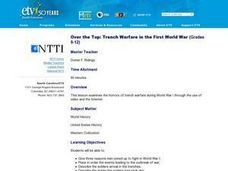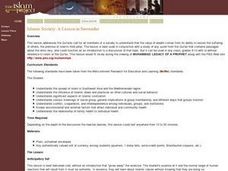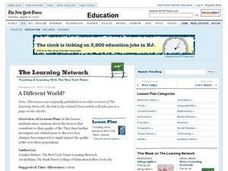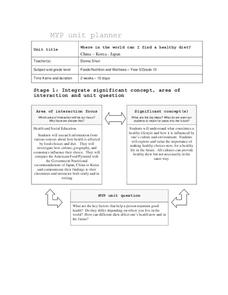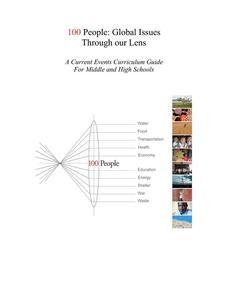Population Connection
A Demographically Divided World
Did you know that birth and life rates vary across the world? The resource, the second in a six-part series, discusses just how demographics differ across countries and why it might be the case. Scholars complete worksheets, watch...
Curated OER
Global Health Issues
Examine global health issues and the philanthropic efforts of Bill Gates. Working in groups, your class will research selected diseases focusing on symptoms, transmission, and prevention. They also conclude by writing grant proposals to...
Curated OER
Over the Top: Trench Warfare in the First World War
Young scholars are able to give three reasons men joined up to fight in World War I. They are able to place in order the event leading to the outbreak of war and describe the soldiers arrival in the trenches. Students are able to ...
Curated OER
Islamic Society: A Lesson in Surrender
High schoolers examine the third pillar of Islam. They discover the influence of Islamic ideas and practices on other cultures, Explore the various meanings of social group and the ways that each group functions. Then, they research the...
American Psychological Association
Childhood Obesity
The United States leads the world in the percentage of obese adults and children. Why? What can be done about the problem? High school psychology classes adopt a problem-focused approach to investigating childhood obesity and then...
Agriculture in the Classroom
Understanding the Columbian Exchange Through Old World and New World Foods
If you're interested in teaching your class about the impact of the Columbian Exchange on contemporary society, this is worth a look. The plan begins with an introduction to the topic, which stems from a cell phone poll...
Curated OER
World Hunger
Young scholars research the causes and effects of world hunger on children. For this world hunger lesson, students discuss causes and effects of hunger around the world and research a specific area affected by hunger. Young scholars...
Curated OER
High-Tech Food: Science in Your Shopping Cart
Kids are given a lot to think about, as they delve into the world of high-tech foods. They discuss GMOs, biotechnology, food enhancements and domestication. They view videos, engage in class discussions, complete worksheets, and learn...
Baylor College
Mapping the Spread of HIV/AIDS
Where is HIV/AIDS most prevalent and what are the current trends regarding HIV? Have groups work together to map the world's HIV/AIDS rates, then create a class map with all the data. Lesson includes cross-disciplinary concepts including...
Curated OER
World Geography: Smart Cities
Students are able to analyze how a variety of cities both in the USA and abroad have worked to improve human health and environment. They combine their prior knowledge of previous lessons and apply that knowledge to compare how each...
Curated OER
A Different World?
Students share their opinions in a brainstorming session on the factors that contribute to their quality of life. They read the article "Life Is Better; It Isn't Better. Which Is It?," from the NY Times and discuss the article as a...
Population Connection
The Peopling of Our Planet
How many people live on the planet, anyway? The first resource in a six-part series covers the topic of the world population. Scholars work in groups to conduct research and make population posters after learning about the global...
Alabama Department of Archives and History
A Worse Death: War or Flu?
In a lesson that integrates history and mathematics, class members create graphs that compare military death statistics from World War I with those that resulted from the influenza pandemic of 1918.
Pulitzer Center
Food Insecurity
Food insecurity, whether as a result of food scarcity or a lack of nutritious food, is a growing and serious problem in the world today. After discussing the concept of food insecurity, learners listen to an NPR radio broadcast on the...
Global Oneness Project
Reclaiming Rivers
Robert Hass's article "Rivers and Stories" underscores the importance of rivers in the development of civilization and the importance of reclaiming supposedly dead rivers and implementing policies that protect river health. Groups...
Children’s Hospital of Philadelphia
Case Study: The 1918 Influenza Pandemic – Factors Beyond the Biological that Influence the Spread of Disease
A very timely lesson looks at the social and political factors that affect the spread of disease. Using the 1918 Influenza Pandemic as a case study, pupils research factors that influenced the spread of the disease, including the role of...
Curated OER
Taking Action! Educating as a Form of Service
Learners read the story Happy Hearts in Manabí by Peace Corps Volunteer Kristen Mallory to consider how educating others can be a form of service. In this health education and service lesson, students read the book and then prioritize...
Ohio State University
Where in the World Can I Find a Healthy Diet?
What constitutes a healthy diet? In what way is a healthy diet defined and influenced by culture? Groups investigate the community and national resources available in a country, and then design a healthy diet for its citizens.
Curated OER
Water Mitigation
Young scholars identify the major health effects of arsenic contamination. They explain how arsenic gets into groundwater in Bangladesh. Students list ways to prevent arsenic from getting into drinking water. They explain why access to...
100 People Foundation
100 People: Global Issues Through Our Lens
If the world were 100 people...17 would not have access to safe drinking water, 18 would not be able to read or write, and 52 would not have a primary education. Using the theme of "100 people," this resource explores other major issues...
Global Oneness Project
Deconstructing Consumerism
A short, engaging video provides a critique of the hyper-consumerist mentality that many think have taken over the Western world. After watching the video, pupils reflect on their own habits and use evidence to respond to discussion and...
Wish for the Future
Wish for the Future
What would be your class's ideal world 30 years in the future? What about 100 years? Use a series of activities to discuss globalization, sustainability, scientific contributions to society, and the global community of which your...
Curated OER
Trust throughout the day
Students draw a picture of a world with and without trust. In this trust lesson plan, students discuss how trust plays a role in their lives every day and how the world would be if we couldn't trust each other.
Curated OER
HEALTH AND BEHAVIORAL STUDIES
Learners select a country in South Africa and writes a one-page report on the economic and social issues facing that country, offering suggestions as to how the conditions of poverty and HIV/AIDS.
Other popular searches
- World Health Organization
- World Health Day
- Math and World Health
- World Health Debate
- Cdc World Health
- World Health Organisation
- World Health Day April7
- World Health About Glennie
- World Health About Glencoe
- World Health Science




